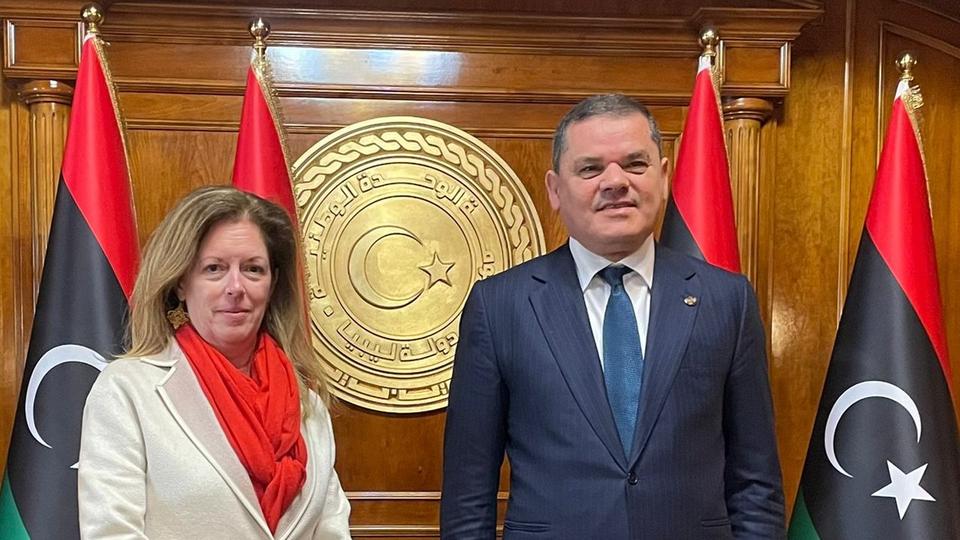 (Twitter)
(Twitter) PM Dbeibah (R) emphasised during his meeting with UN adviser Williams the need to complete the political roadmap approved in Geneva.
An African Nation Contending with Two Governments
Tensions in Libya have risen again with the appointment of a new Premier, Fathi Bashagha, by the Parliament in Tobruk. Bashagha is now contending for the position with Abdel Hamid Dbeibah, an UN-recognized leader.
After the announcement, Bashagha went to Tripoli airport to deliver his inaugural speech as Libya’s president. There was no shortage of allusions to Dbeibah, who was dismissed by the new president, with no shortage of accusations of his irresponsible use of Libyan resources, as stated in a Washington Times piece.
How and Why Libya Contends with Two Parallel Governments
The country is split in two, with one side led by a new minister and the other led by a minister who has no intention of retiring. Despite the fact that Bashagha’s elections are a first step in healing the country’s internal rift, Libya is once again controlled by two parallel governments.
The Egyptian government and Khalifa Haftar, a major Libyan political figure, have both expressed their support for this new administration.
Bashagha, a former Interior Minister, is the de facto head of the Misurata militia, which played a critical part in the military campaign that stopped the takeover of Tripoli by Haftar’s Libyan National Army (LNA) at the start of 2020. He is thought to be particularly connected to Turkish intelligence agencies, which makes him the ideal guarantee of Ankara’s interests in Libya. In particular, he was a major member of the cabinet that signed the accord on marine borders. During a press conference in Istanbul in November, he requested Turkey to take a more active role in the development of the North African “country.”
In reality, leading members of the Libyan parliament agreed in December to maintain the viability of the maritime border deal with Turkey. While Turkish Foreign Minister Mevlüt avuşolu said that Haftar has requested a meeting with President Recep Tayyip Erdogan.
It is no surprise, though, that no remarks or replies to the delegitimization of Dbeibah, of which the Turks are the principal sponsors, have arrived in Ankara.
Meanwhile, Dbeibah has the support of the United States of America and Tripoli’s militias. The assassination attempt on February 10th brought this ahead. On the contrary, Haftar and Egypt are openly ecstatic, having long selected Bashagha as the Trojan horse to gamble on in order to regain control of Tripoli, the Libyan capital.
UN Secretary-General Antonio Guterres encouraged “all parties to keep Libya’s stability as a key priority.” Guterres reminded “all institutions of the principal purpose of conducting elections as soon as feasible” in a statement. The secretary-general’s spokesperson reiterated recently that the UN continues to endorse Dbeibah as prime minister.
Libyans Need to Resolve Past Mistakes
This is a different situation than previous ones, but it is evident that the splintering of a country that is attempting to heal profound wounds from the recent past will not be easy.
The political crisis in Libya is once again a sad chapter in the history of a state trying to be reborn, a state trying to find stability. The people would like to have confidence in their government. Libyans would like to work with the government so that a balance and a new chapter in their history can be re-established.
But the problem lies in the fact that both political figures who aspire to speak for the people won’t be able to do so without a compromise. The identity of the Libyan people seems to be weakened by this conflict of interests, a weakening that is also due to the coercive power that has become practical in everyday life, a power that is often devious and subtle, such as the actual division of the representation of citizens by these two governments.
This situation, if it continues, will cause nothing but mistrust, demotivation, and flight from the country.
Libya is the main port of departure for barges to Europe, so this crisis will create more problems for the region, including the departures of its citizens, and the citizens of neighboring states.
In times of chaos, it is well known that the rate of corruption and crime increases. This is the biggest risk for the struggling nation. Libyans need to resolve cracks in the past, not open them wider and wider.
